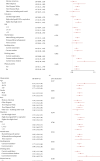Association of Three Composite Inflammatory and Lipid Metabolism Indicators With Cardiovascular-Kidney-Metabolic Syndrome: A Cross-Sectional Study Based on NHANES 1999-2020
- PMID: 40376312
- PMCID: PMC12081155
- DOI: 10.1155/mi/6691516
Association of Three Composite Inflammatory and Lipid Metabolism Indicators With Cardiovascular-Kidney-Metabolic Syndrome: A Cross-Sectional Study Based on NHANES 1999-2020
Abstract
Background: Various leukocyte-to-high-density lipoprotein cholesterol (HDL-C) ratios, namely the neutrophil to HDL-C ratio (NHR), lymphocyte to HDL-C ratio (LHR), and monocyte to HDL-C ratio (MHR), have been identified as potential inflammatory biomarkers. Despite this, the intricate relationship between these ratios and Cardiovascular-Kidney-Metabolic (CKM) Syndrome has yet to be fully elucidated. This study aims to explore the associations between these white blood cell ratios and the presence of CKM Syndrome. Methods: This cross-sectional retrospective analysis utilized data from 19,534 individuals diagnosed with CKM Syndrome, sourced from the National Health and Nutrition Examination Survey (NHANES) database covering the years 1999-2020. Participants were stratified, and relevant covariates were adjusted during the analysis. Weighted logistic regression models were employed to statistically assess the relationships between the inflammatory markers and the differing stages of CKM Syndrome, with stage 0 serving as the reference point. Results: After adjusting for all the covariates, high levels of three inflammatory indicators were associated with higher odds of having CKM Syndrome stage 1-4, using stage 0 as a reference. When we assessed the associations between inflammatory indicators with stage 3-4 with stage 0-1-2 as the reference group, we found that inflammatory indicators still increased the risk of higher CKM Syndrome stage. The dose-response relationship revealed that the inflammatory indicators increased the risk of higher CKM Syndrome stage. After conducting subgroup analyses, we found that LHR and education, as well as LHR, MHR, and drinking status, had significant interactions. Conclusion: Elevated NHR, LHR, and MHR are significantly associated with an increased risk of CKM Syndrome across stages 1-4.
Keywords: CKM syndrome; cardiovascular-kidney-metabolic syndrome; lymphocyte to HDL-C ratio (LHR); monocyte to HDL-C ratio (MHR); neutrophil to HDL-C ratio (NHR).
Copyright © 2025 Jiayuan Song et al. Mediators of Inflammation published by John Wiley & Sons Ltd.
Conflict of interest statement
The authors declare no conflicts of interest.
Figures



Similar articles
-
Association between high-density lipoprotein-related inflammation index and periodontitis: insights from NHANES 2009-2014.Lipids Health Dis. 2024 Sep 28;23(1):321. doi: 10.1186/s12944-024-02312-9. Lipids Health Dis. 2024. PMID: 39342327 Free PMC article.
-
Association between atherogenic index of plasma with all-cause and cardiovascular mortality in individuals with Cardiovascular-Kidney-Metabolic syndrome.Cardiovasc Diabetol. 2025 Apr 26;24(1):183. doi: 10.1186/s12933-025-02742-4. Cardiovasc Diabetol. 2025. PMID: 40287685 Free PMC article.
-
The prognostic significance of stress hyperglycemia ratio in evaluating all-cause and cardiovascular mortality risk among individuals across stages 0-3 of cardiovascular-kidney-metabolic syndrome: evidence from two cohort studies.Cardiovasc Diabetol. 2025 Mar 24;24(1):137. doi: 10.1186/s12933-025-02689-6. Cardiovasc Diabetol. 2025. PMID: 40128747 Free PMC article.
-
The association between neutrophil and lymphocyte to high-density lipoprotein cholesterol ratio and metabolic syndrome among Iranian population, finding from Bandare Kong cohort study.Lipids Health Dis. 2024 Nov 28;23(1):393. doi: 10.1186/s12944-024-02378-5. Lipids Health Dis. 2024. PMID: 39604922 Free PMC article.
-
hs-CRP/HDL-C can predict the risk of all cause mortality in cardiovascular-kidney-metabolic syndrome stage 1-4 patients.Front Endocrinol (Lausanne). 2025 Apr 10;16:1552219. doi: 10.3389/fendo.2025.1552219. eCollection 2025. Front Endocrinol (Lausanne). 2025. PMID: 40276550 Free PMC article.
References
-
- Ndumele C. E., Neeland I. J., Tuttle K. R., et al. A Synopsis of the Evidence for the Science and Clinical Management of Cardiovascular-Kidney-Metabolic (CKM) Syndrome: A Scientific Statement From the American Heart Association. Circulation . 2023;148(20):1636–1664. doi: 10.1161/CIR.0000000000001186. - DOI - PubMed
MeSH terms
Substances
LinkOut - more resources
Full Text Sources
Medical
Miscellaneous

